Masimba Musodza's Blog: Writer's Blog, page 2
April 11, 2014
Herbert Wants To Come Home Makes JP30
When I launched Herbert Wants To Come Home on JukePop Serials, I knew I was on to a winner. But I had no idea at all that it would be such a success. In February, it was announced that Herbert Wants To Come Home had entered the JukePop Serials JP30 (the 30 most popular stories on the JukePop platform)

From that time, it began the steady climb, finishing off at Number 4 at the end of March 2014. On the first of April it was at number 1.

Part of this success I must attribute to my own efforts at publicity. But the greatest portion is the fruits of the efforts of people around the world.It would be impossible to name them all, but I acknowledge the zeal of Fadzayi Ruzengwe, Chido Musodza and of course Desmond Mangwiro. And fellow authors, such as R Tendo Tapiwa and Chris Mlalazi. I also have to mention media organisations such as The Zimbabwean and Bulawayo 24 News and 2FeetAfrica. Media specialising in the horror genre have started to take notice too.
I am pleasantly surprised at the interest from Zimbabweans, which overturns everything that has been said about the support of my compatriots for literature. Perhaps it is an issue of delivery. While there are not a lot of Zimbabweans stepping in to bookstores (to be fair, there are not a lot of bookstores for Zimbabweans to step in to), there are many with smartphones and internet access. Clearly, e-books offer a viable publishing option for authors and publishers alike. I hope someone is taking notes and will be working on ideas for this soon! I know there are some Zimbabwean authors who are watching to see how it plays out. Imitation is the greatest form of flattery, as the saying goes.
I can't rest on my success. However pleasing the stats from dominating the JP30 series might be, nothing beats a real book. So, plans are underway to roll out a limited edition hardback. There may be paperback rights sales, I have put a few hooks out there, we'll see what bites.
Overall, I am pleased with the way this project is going.

From that time, it began the steady climb, finishing off at Number 4 at the end of March 2014. On the first of April it was at number 1.

Part of this success I must attribute to my own efforts at publicity. But the greatest portion is the fruits of the efforts of people around the world.It would be impossible to name them all, but I acknowledge the zeal of Fadzayi Ruzengwe, Chido Musodza and of course Desmond Mangwiro. And fellow authors, such as R Tendo Tapiwa and Chris Mlalazi. I also have to mention media organisations such as The Zimbabwean and Bulawayo 24 News and 2FeetAfrica. Media specialising in the horror genre have started to take notice too.
I am pleasantly surprised at the interest from Zimbabweans, which overturns everything that has been said about the support of my compatriots for literature. Perhaps it is an issue of delivery. While there are not a lot of Zimbabweans stepping in to bookstores (to be fair, there are not a lot of bookstores for Zimbabweans to step in to), there are many with smartphones and internet access. Clearly, e-books offer a viable publishing option for authors and publishers alike. I hope someone is taking notes and will be working on ideas for this soon! I know there are some Zimbabwean authors who are watching to see how it plays out. Imitation is the greatest form of flattery, as the saying goes.
I can't rest on my success. However pleasing the stats from dominating the JP30 series might be, nothing beats a real book. So, plans are underway to roll out a limited edition hardback. There may be paperback rights sales, I have put a few hooks out there, we'll see what bites.
Overall, I am pleased with the way this project is going.
Published on April 11, 2014 21:02
September 16, 2013
Herbert Wants To Come Home
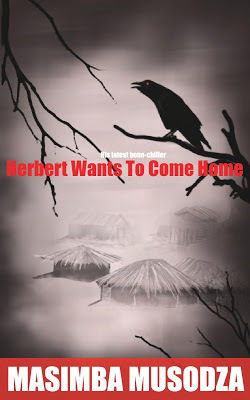
JukePop Serials finally accepted this draft of the much-awaited Herbert Wants To Come Home. The first ever vampire novel set mainly in Zimbabwe, although the events precipitating occur in Romania (of course).
But that it is a story about vampires, unknown in Zimbabwean lore, is not the reason why this is yet another ground-breaking literally undertaking from yours truly. Herbert Wants To Come Home is unique as a piece of Zimbabwean literature in that it will be published in series. Apparently, that is how many of the popular Victorian writers of their day made many of their monumental works available to the public. The first ever such series that I ever came across was Stephen King's The Green Mile. In the full novel edition, King writes in a foreword that the idea to serialise was put to him by a British publisher, who cited the example of Charles Dickens. As we all know, The Green Mile became a bestseller.
Herbert Wants To Come Home will be serialised on Jukepop Serials first, and hopefully this will lead to a book deal later. For a writer, it is gratifying to note that JukePop Serials do not just take on any old work; each story goes through a vigorous selection process. So, that draft meets certain standards. This is very important for a work that will circulate first through social media, and will obviously receive most accolades from friends and family rather than critical readers.
Writing for an online publishing platform meant that I had to change the format of the novel somewhat, and I may revert to the original for the book version. In the original, the story is told in the epistolary style, a nod to 'Bram Stoker's Dracula. Of course, in the 21st century, the documents that record events as they unfold and build a novel take the form of not only diary entries and newspaper cuttings, but missing persons' reports, medical reports, e-mail messages, mobile phone text messages etc. I will leave it for my readers to decide whether they find the prose insertions actually useful.
I hope you all enjoy reading and looking forward to your comments. To go to the first chapter, follow the link below.
https://www.jukepopserials.com/home/r...
Published on September 16, 2013 03:32
September 9, 2013
They spelt my name wrong!! But I can confirm that I will ...

They spelt my name wrong!!
But I can confirm that I will be there. This will be a chance to meet not only Spiwe N. Mahachi-Harper, but several distinguished Zimbabweans. I will give a short talk on the contributions made by people of Malawian and Zambian immigrants to Zimbabwe (from the colonial period to the present) to popular Zimbabwean culture.
See you there
Published on September 09, 2013 07:51
June 19, 2013
A Zimbabwean Vampire Story
The Foreword to Herbert Wants to Come Home
There is a huge colony of Zimbabweans in the same country which helped to destroy Dambudzo Marechera and too many of them cannot find their way "home"- Dr Tafataona Mahoso, Ngozi and the struggle to revalue African life
"It's my boy; it's Herbert!" she cried, struggling mechanically. "I forgot it was two miles away. What are you holding me for? Let go. I must open the door."
"For God's sake, don't let it in," cried the old man trembling.
"You're afraid of your own son," she cried, struggling. – W.W. Jacobs, The Monkey’s Paw
How does an African man get to writing about vampires, a European myth? In a nutshell: years of cultural exchange. Or rather, years of cultural imposition. In post-Independence Zimbabwe, the vehicle for this imposition was not the missionaries, the schools and sheer brute force, but the state-owned broadcaster.
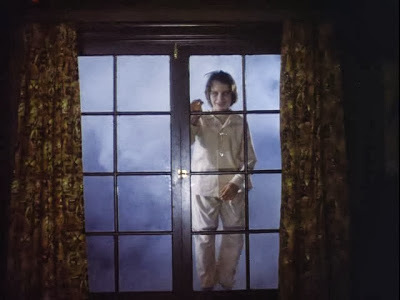 More personally, of course, I was exposed to the vampire myth at a very early age. I was nine, and my brother, Kudzai, was seven, when we begged our mother to let us watch ‘Salem’s Lot. Normally, we were not allowed to watch television after eight o’clock, but our father- a senior civil servant with the Ministry of Lands and Agriculture- was out on a trip to the countryside that Monday evening.
More personally, of course, I was exposed to the vampire myth at a very early age. I was nine, and my brother, Kudzai, was seven, when we begged our mother to let us watch ‘Salem’s Lot. Normally, we were not allowed to watch television after eight o’clock, but our father- a senior civil servant with the Ministry of Lands and Agriculture- was out on a trip to the countryside that Monday evening.
In retrospect, it wasn’t a good idea to let children watch ‘Salem’s Lot. I doubt that had she known what it was actually about, my mother would have let us see it. Suffice to say, we were not allowed to watch further episodes of the miniseries. But she did watch the following episode by herself, and told us about it the next day, for it was still a great story to tell.
The only other vampires that we got to see in the ‘80s were The Groovy Ghoulies and the recurring horror-themed sketch in the Wolfman Jack Show.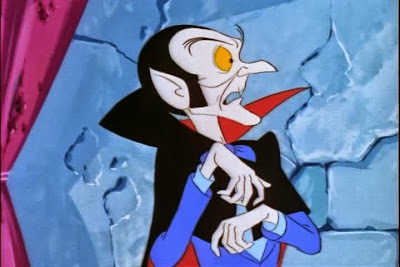 Later in life, I came across not only the book version of ‘Salem’s Lot, but also Bram Stoker’s Dracula and other classic works. There was also a vampire on Sesame Street, but this character was more a play on Dracula's title, Count, as he played numeracy games with child audiences than a real monster. I also read up on the history of the
Later in life, I came across not only the book version of ‘Salem’s Lot, but also Bram Stoker’s Dracula and other classic works. There was also a vampire on Sesame Street, but this character was more a play on Dracula's title, Count, as he played numeracy games with child audiences than a real monster. I also read up on the history of the
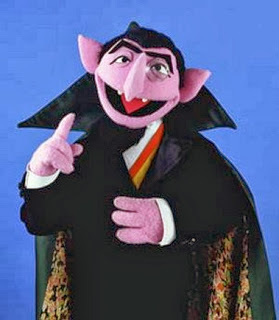 vampire myth. While it is clear to me that we have nothing like it in the lore of my culture, I found it interesting that one of the European words for the modern vampire, moroi, sounds very much like muroyi, the word in my native ChiShona for “witch”. Even at that age, I was ready to learn not only about far away places and cultures, but also my own and make comparisons.
vampire myth. While it is clear to me that we have nothing like it in the lore of my culture, I found it interesting that one of the European words for the modern vampire, moroi, sounds very much like muroyi, the word in my native ChiShona for “witch”. Even at that age, I was ready to learn not only about far away places and cultures, but also my own and make comparisons.
It’s been over ten years since many of my generation left the turmoil of Zimbabwe for South Africa, the U.K., the U.S., Canada, anywhere really. In that time, many of us have made a home in the lands were we live. While the recent emigration is a direct result of the political problems that have engulfed my country, our people have always been on the move. My great-grandfather trekked to South Africa and worked there for a while. Subsequent generations saw men leave the so-called Tribal Trust Lands where the colonial authorities had banished indigenous people to, to work the mines and factories. In fact, the young man leaving the village to seek his fortune, then inevitably falling aside to dissolution before finding his way back is a regular motif of colonial and early post-colonial Zimbabwean literature. You could even describe this genre as Zimbabwe’s first horror stories, as it always took supernatural manifestations to get the dissolute young man to return to his roots and reinforced the fear of loosing one's roots to young men in the real world.
By the time my parents married, families were becoming more urbanised. Kumusha or Ekhaya became for my generation where Sekuru/Malume (Grandfather) and Ambuya/Gogo (Grandmother) lived. For me, both sets of my grandparents did have property in the city and my paternal side only moved back to the country when my grandfather retired, so it is fair to describe me as completely urbanised.
When our generation moved abroad, it was easy to think of the whole of Zimbabwe as kumusha/ekhaya. Ten years later, many of us have settled here in the West. Settled here does not necessarily mean we are the roaring successes that we thought we’d be, that we set out to be or we would have never left. There are so many broken dreams, so many shattered hopes, that a pity party for the Zimbabwean community would last for months. There are so many of us right now hanging on in quiet desperation, too ashamed to catch a plane back to Zimbabwe and face a very judgmental, very unforgiving society. Or, more realistically, knowing that they no longer have the energy they had a decade ago to work and make things better here or back home. They feel that their life-force, the best years of their lives have gone. If there has been any pokol; vurderlak; eyalik, it has happened to the Zimbabwean people. That too is another set of fears.
Yet, few Zimbabweans would even entertain the idea of being buried here. The concept of kumusha/ekhaya is so deeply engrained in us. Despite the high cost of repatriating a body, despite reports that the Zimbabwe government will not admit the body of someone who now bears the passport of another country, we all want to be buried there. And, yes, that too is another set of fears.
I suppose going home to die is better than going home alive to face whatever issues one left, or even the ones that have brewed in one’s absence. Going home to die may be better too for the people at home. After so many years abroad, there is the fear among Zimbabweans who have remained behind that their relatives and friends have changed. Not only changed, but mutated.
That is what my story is about. And that is why it is a horror story. Horror stories are about that human emotion; fear. And for those returning, as well as those who wait for those who return, there is a lot to be afraid of. For those still in England, those determined to stay on, there is plenty to be afraid of too. It is no coincidence that Herbert dies at the time that the 2011 London Riots begin. But let me not give too much away.
There is a huge colony of Zimbabweans in the same country which helped to destroy Dambudzo Marechera and too many of them cannot find their way "home"- Dr Tafataona Mahoso, Ngozi and the struggle to revalue African life
"It's my boy; it's Herbert!" she cried, struggling mechanically. "I forgot it was two miles away. What are you holding me for? Let go. I must open the door."
"For God's sake, don't let it in," cried the old man trembling.
"You're afraid of your own son," she cried, struggling. – W.W. Jacobs, The Monkey’s Paw
How does an African man get to writing about vampires, a European myth? In a nutshell: years of cultural exchange. Or rather, years of cultural imposition. In post-Independence Zimbabwe, the vehicle for this imposition was not the missionaries, the schools and sheer brute force, but the state-owned broadcaster.
 More personally, of course, I was exposed to the vampire myth at a very early age. I was nine, and my brother, Kudzai, was seven, when we begged our mother to let us watch ‘Salem’s Lot. Normally, we were not allowed to watch television after eight o’clock, but our father- a senior civil servant with the Ministry of Lands and Agriculture- was out on a trip to the countryside that Monday evening.
More personally, of course, I was exposed to the vampire myth at a very early age. I was nine, and my brother, Kudzai, was seven, when we begged our mother to let us watch ‘Salem’s Lot. Normally, we were not allowed to watch television after eight o’clock, but our father- a senior civil servant with the Ministry of Lands and Agriculture- was out on a trip to the countryside that Monday evening. In retrospect, it wasn’t a good idea to let children watch ‘Salem’s Lot. I doubt that had she known what it was actually about, my mother would have let us see it. Suffice to say, we were not allowed to watch further episodes of the miniseries. But she did watch the following episode by herself, and told us about it the next day, for it was still a great story to tell.
The only other vampires that we got to see in the ‘80s were The Groovy Ghoulies and the recurring horror-themed sketch in the Wolfman Jack Show.
 Later in life, I came across not only the book version of ‘Salem’s Lot, but also Bram Stoker’s Dracula and other classic works. There was also a vampire on Sesame Street, but this character was more a play on Dracula's title, Count, as he played numeracy games with child audiences than a real monster. I also read up on the history of the
Later in life, I came across not only the book version of ‘Salem’s Lot, but also Bram Stoker’s Dracula and other classic works. There was also a vampire on Sesame Street, but this character was more a play on Dracula's title, Count, as he played numeracy games with child audiences than a real monster. I also read up on the history of the
 vampire myth. While it is clear to me that we have nothing like it in the lore of my culture, I found it interesting that one of the European words for the modern vampire, moroi, sounds very much like muroyi, the word in my native ChiShona for “witch”. Even at that age, I was ready to learn not only about far away places and cultures, but also my own and make comparisons.
vampire myth. While it is clear to me that we have nothing like it in the lore of my culture, I found it interesting that one of the European words for the modern vampire, moroi, sounds very much like muroyi, the word in my native ChiShona for “witch”. Even at that age, I was ready to learn not only about far away places and cultures, but also my own and make comparisons. It’s been over ten years since many of my generation left the turmoil of Zimbabwe for South Africa, the U.K., the U.S., Canada, anywhere really. In that time, many of us have made a home in the lands were we live. While the recent emigration is a direct result of the political problems that have engulfed my country, our people have always been on the move. My great-grandfather trekked to South Africa and worked there for a while. Subsequent generations saw men leave the so-called Tribal Trust Lands where the colonial authorities had banished indigenous people to, to work the mines and factories. In fact, the young man leaving the village to seek his fortune, then inevitably falling aside to dissolution before finding his way back is a regular motif of colonial and early post-colonial Zimbabwean literature. You could even describe this genre as Zimbabwe’s first horror stories, as it always took supernatural manifestations to get the dissolute young man to return to his roots and reinforced the fear of loosing one's roots to young men in the real world.
By the time my parents married, families were becoming more urbanised. Kumusha or Ekhaya became for my generation where Sekuru/Malume (Grandfather) and Ambuya/Gogo (Grandmother) lived. For me, both sets of my grandparents did have property in the city and my paternal side only moved back to the country when my grandfather retired, so it is fair to describe me as completely urbanised.
When our generation moved abroad, it was easy to think of the whole of Zimbabwe as kumusha/ekhaya. Ten years later, many of us have settled here in the West. Settled here does not necessarily mean we are the roaring successes that we thought we’d be, that we set out to be or we would have never left. There are so many broken dreams, so many shattered hopes, that a pity party for the Zimbabwean community would last for months. There are so many of us right now hanging on in quiet desperation, too ashamed to catch a plane back to Zimbabwe and face a very judgmental, very unforgiving society. Or, more realistically, knowing that they no longer have the energy they had a decade ago to work and make things better here or back home. They feel that their life-force, the best years of their lives have gone. If there has been any pokol; vurderlak; eyalik, it has happened to the Zimbabwean people. That too is another set of fears.
Yet, few Zimbabweans would even entertain the idea of being buried here. The concept of kumusha/ekhaya is so deeply engrained in us. Despite the high cost of repatriating a body, despite reports that the Zimbabwe government will not admit the body of someone who now bears the passport of another country, we all want to be buried there. And, yes, that too is another set of fears.
I suppose going home to die is better than going home alive to face whatever issues one left, or even the ones that have brewed in one’s absence. Going home to die may be better too for the people at home. After so many years abroad, there is the fear among Zimbabweans who have remained behind that their relatives and friends have changed. Not only changed, but mutated.
That is what my story is about. And that is why it is a horror story. Horror stories are about that human emotion; fear. And for those returning, as well as those who wait for those who return, there is a lot to be afraid of. For those still in England, those determined to stay on, there is plenty to be afraid of too. It is no coincidence that Herbert dies at the time that the 2011 London Riots begin. But let me not give too much away.
Published on June 19, 2013 15:03
February 2, 2013
Chishamiso to be made in to a short film
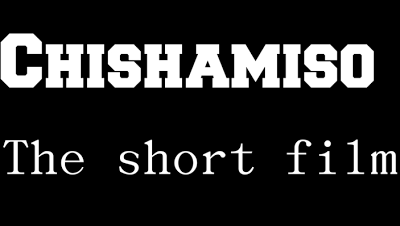
It is a little known fact that I started my professional writing career as a screenwriter back in Zimbabwe. I did my training first at Vision Valley Film, Video & Television Institute, which was going to be the country's major film school but came crashing down as soon as it launched. I also did a Screenwriter's Course at Edgar Langeveldt's Nexus Talent Agency, where the tutor was Karl Dorn of the And To My Nephew Moses fame. Then I did a couple of specialized courses: Writing Comedy for Television & Radio with the African Script Development Fund and Writing for Short Film with the Zimbabwe International Film Festival. A few months after this last course, I was in the UK.
I have emerged as a novelist and short-story writer, but screenplays are still my specialty. I have written for a few international clients, the first of these being a Nigerian film maker who was going to make a movie about a couple struggling to conceive. Since I launched Oriit Films Ltd, I tend to not do spec work. I charge industry rates for my services, and have little patience with those who entertain the daft notion that just because they have never heard of me, they can get me to work for free or "deferred payment", which is always the same thing anyway.
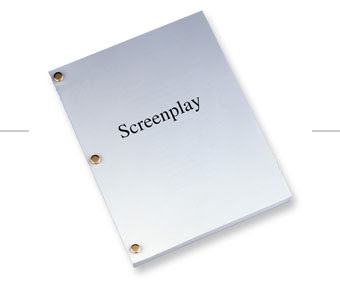
Last month, an old friend, Angeline Dimingo, got in touch with me and suggested adapting my short story, Chishamiso for the screen. So, I wrote the script. Dimingo has bagged the delicious Dalma Chiwereva (Lobola) to play Chishamiso and Melgin Tafirenyika (I Will Marry Myself)as Declan. Production will be by Dimingo's Tariro Productions in Zimbabwe. Oriit Films Ltd, my company will take over for the international distribution and sales aspect.
As a Zimbabwean writer living in the UK, I am very excited about this project. Artistes such as Chiwereva and Tafirenyika were unknown when I was still in that country, and so to have them giving screen life to my work offers me the opportunity to continue to remain on Zimbabwe's cultural landscape even if I am not geographically there. And of course the fact that I will seek to have the short movie shown to audiences in England and the west will elevate these two actors' profiles internationally.
My best wishes to everyone who is taking part.
Published on February 02, 2013 15:49
October 17, 2012
Chishamiso published in Jamaica
My short story, Chishamiso was published on the 7th of October 2012 in Jamaica's Sunday Observer Bookends Magazine. As some of you know, this story first appeared on the LET'S TALK ABOUT IT ALL WITH THANDI website. There were calls for the story to continue, and I was prevailed upon to develop on the original idea, so a novella may yet arise from all this.
I am exceptionally pleased with this publication in Jamaica. I don't know if there have been other Zimbabwean writers who have been given this kind of attention, but it establishes the potential for our two cultures to interact without neccessarily going through Europe and America's media. Recently, I was published in a South African magazine, Jungle Jim. There is a project to reach out to Italy and Brazil as well.
I want to thank Bettina Sibanda, who asked me to write this story first for LET'S TALK ABOUT IT ALL WITH THANDI, and Empress Makeda Barbara Blake Hannah for drawing it to the attention of the Bookends editor, Sarah Leach. And, all those people who have read it.
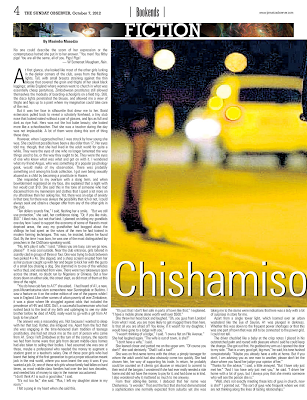
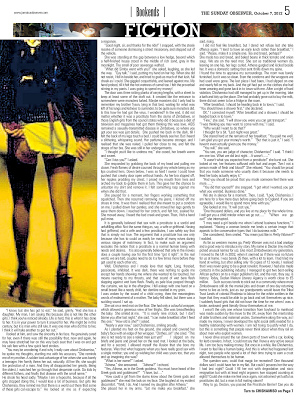
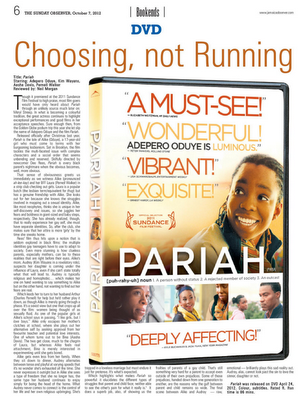
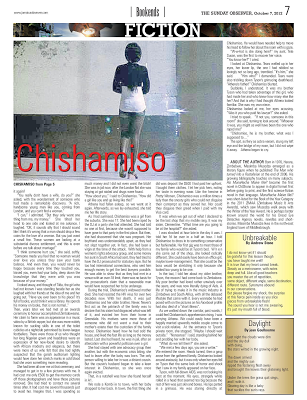
I am exceptionally pleased with this publication in Jamaica. I don't know if there have been other Zimbabwean writers who have been given this kind of attention, but it establishes the potential for our two cultures to interact without neccessarily going through Europe and America's media. Recently, I was published in a South African magazine, Jungle Jim. There is a project to reach out to Italy and Brazil as well.
I want to thank Bettina Sibanda, who asked me to write this story first for LET'S TALK ABOUT IT ALL WITH THANDI, and Empress Makeda Barbara Blake Hannah for drawing it to the attention of the Bookends editor, Sarah Leach. And, all those people who have read it.




Published on October 17, 2012 07:51
Writer's Blog
Forget Writer's Block, this is Writer's Blog. Here, I make a note of my work, the story behind the story as it were.
Forget Writer's Block, this is Writer's Blog. Here, I make a note of my work, the story behind the story as it were.
...more
- Masimba Musodza's profile
- 10 followers



